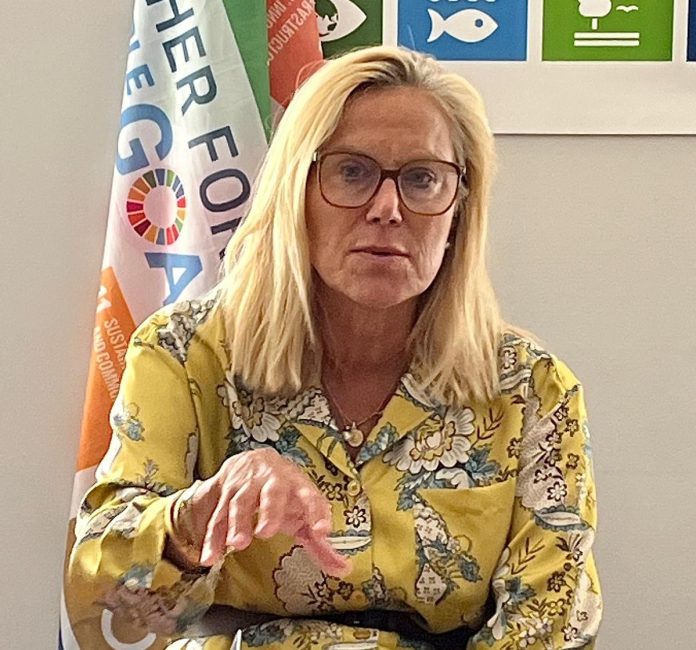“We will be heading towards 41,000 civilian dead in Gaza; it’s a matter of time, I fear”, stated Sigrid Kaag, the Senior UN Coordinator for Humanitarian Action and Reconstruction in Gaza since January 2024. After a meeting with the EU Foreign Ministers, she gave a press briefing at UNRIC’s offices today.
“We know that 2 million people seek shelter in 15 square miles. Most have been displaced multiple times over these 11 months. The extent of the destruction, which is very important to be seen by international journalists, not just citizens reporting from Gaza, is quite unbelievable if you are confronted with it for the first time. 96 % of the population of 2.1 million is acutely food insecure”.
A Dutch national, Sigrid Kaag served as the first Deputy Prime Minister and first female Minister of Finance in the Dutch Government (2022-24). She has also held senior positions in the United Nations system from 1994 to 2017 in the Middle East.
“Constructive cooperation” with Israel
“The focus of my mission is to engage at the highest level with the Israeli government, stated Sigrid Kaag in her introduction to journalists. I always have to underscore that the cooperation with my mission is good and constructive. We now have the agreement at the highest levels to launch the polio vaccination campaign hopefully this Saturday.”
“The resolution that I have on behalf of the Security Council is, on the one hand, a political resolution on humanitarian assistance, on the other hand, very operational with certain deliverables. I speak all the time with ministers of Foreign Affairs and to counterparts in the region, but the difficulty that humanitarians face in war and conflict, is the ability to distribute, the necessity of effective “deconfliction” as it is called (…). It is a war zone and more needs to be done by all parties. There’s no substitute for compliance to international humanitarian law by all parties.”
“Gaza should not be forgotten.”
“It’s not an optimistic tale that I have. It is a story of deep concern over the fate of the hostages and the impact on Israeli society. The position the UN has always had is about the legitimacy of Israel’s security concerns and at the same time the need, post this crisis, if and when there is a ceasefire, to address and look at the political horizon of the two States solution with a viable independent Palestinian state alongside a safe and secure Israel.”
“But Gaza in itself should not be forgotten. (…) I would have a concern that people get used to the fact that there is a huge problem. There’s always a risk of looking away and thinking “oh well, life goes on”. I see it as the duty of the UN to keep putting the spotlight back again on what the international community can do”.
Evacuating 12 000 wounded Palestinians for treatment
Among the topics Sigrid Kaag discussed in Brussels is the planning of EU financial support for the reconstruction of Gaza, even if “we may be very far off of having clarity on the political and security arrangements”.
She also discussed in Brussels the fate of over 12,000 Palestinian civilians that are “severely impacted and war wounded”, and need to be immediately evacuated from Gaza, where they cannot be treated. “This is a gesture of solidarity, and we should not only ask Egypt, the UAE or Qatar to take on patients. Italy has stepped forward, as well as several other countries. It is very good, humane, and practically feasible”.
“Not a matter of counting trucks.”
According to the latest UNRWA situation report, several challenges stand in the way of collecting much-needed humanitarian supplies from the Karem Abu Salem (Kerem Shalom) crossing point in southern Gaza. These include deteriorating law and order, war and insecurity, damaged infrastructure, fuel shortages and access restrictions.
According to OCHA, between 1 and 12 August 2024, on average only 76 humanitarian trucks entered the Gaza Strip daily. This is well below the pre-crisis average of 500 trucks of humanitarian aid per working day, on a total of 1,000 trucks, commercial included.
Sigrid Kaag has shed new light on those figures, insisting on the importance of other entry points to transport goods from Jordan and not only from Israel. “Due to lawlessness and criminal activities, even if the trucks arrive in Gaza, it doesn’t mean the goods are received properly. The only metric that ultimately counts is if people have received the goods. (…) I fundamentally believe we should never have been counting trucks. I said it at my first Security Council briefing: “We need to look at what people need; these are issues of rights and obligations under the international humanitarian law. Trucks are a means of transport, nothing more”.
As for the main thing that Palestinians need in Gaza, Sigrid Kaag stated it is a “ceasefire, safety and security”. “This needs to stop”.




